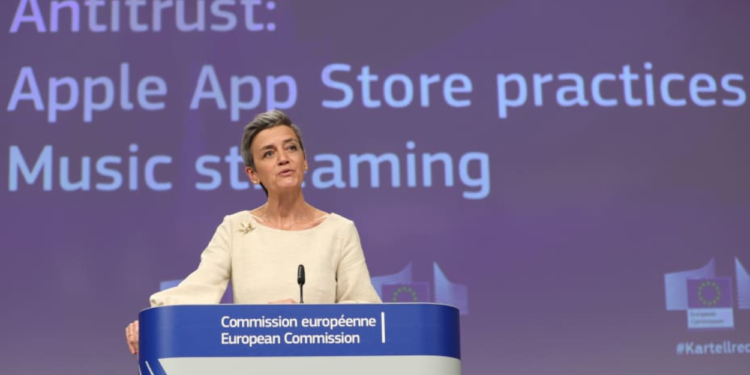Brussels ( Brussels Morning) – EU Commission probes Apple, Alphabet, Meta for potential Digital Markets Act violations, targeting anti-steering rules, self-preferencing, and ‘pay and consent’ models.
The EU Commission on Monday unlocked an investigation into Apple, Alphabet and Meta, in its first examination under the comprehensive new Digital Markets Act tech legislation.
“Today, the Commission has extended non-compliance investigations under the Digital Markets Act (DMA) into Alphabet’s rules on driving in Google Play and self-preferencing on Google Search, Apple’s controls on steering in the App Store and the choice screen for Safari and Meta’s ‘pay or consent model’,” the Commission stated in a statement.
Tech Giants Under Scrutiny
The first two investigations focus on Alphabet and Apple and relate to so-called “anti-steering rules.” Under the DMA, tech companies are not allowed to block businesses from disclosing to their users about cheaper alternatives for their products or subscriptions beyond an app store. “The way that Apple and Alphabet executed the DMA rules on anti-steering appears to be at odds with the letter of the law. Apple and Alphabet will still consider various recurring fees, and still limit steering,” EU competition chief Margrethe Vestager stated during a press conference on Monday.
Apple has already violated EU rules. This month, the business was fined 1.8 billion euros after the European Commission stated it found that Apple had applied constraints on app developers that prevented them from reporting iOS users about alternative and more affordable music subscription services available outside of the app. In a third investigation, the Commission stated it is investigating whether Apple has conceded with its DMA obligations to ensure that users can effortlessly uninstall apps on iOS and modify default settings. The probe also concentrates on whether Apple is actively encouraging users with choices to allow them to adjust default services on iOS, such as for the web browser or search engine.
The Commission stated that it is “concerned that Apple’s measures, including the structure of the web browser choice screen, maybe stopping users from truly exercising their choice of services within the Apple ecosystem.”
Apple said it thinks it complies with the DMA. “We’re confident our plan complies with the DMA, and we’ll continue to constructively engage with the EU Commission as they perform their investigations. Teams across Apple have developed a wide range of new developer capabilities, features, and instruments to comply with the regulation,” an Apple spokesperson said.
The fourth examination targets Alphabet, as the EU Commission looks into whether the company display of Google search results “may direct to self-preferencing about Google’s,” other services such as Google Shopping, over comparable rival offerings.
The fifth and final probe focuses on Meta and its so-called “pay and consent” standard. Last year, Meta presented an ad-free subscription model for Facebook and Instagram in Europe. The Commission is examining whether offering the subscription model without ads or pushing users’ consent to terms and requirements for the free service is in violation of the DMA.
“The Commission is concerned that the binary choice charged by Meta’s ‘pay or consent’ model may not deliver a real alternative in case users do not consent, thereby not attaining the objective of controlling the accumulation of personal data by gatekeepers.” Thierry Breton, the EU’s internal market commissioner, stated during a press meeting that there should be “free choices” offered by Meta for its assistance that are “less personalized.”
“Gatekeepers” is a label for large tech companies that are required to concede with the DMA in the EU. “We will continue to use all functional tools, should any gatekeeper try to avoid or undermine the obligations of the DMA,” Vestager expressed.
The Commission said it plans to conclude its investigations within 12 months, but Vestager and Breton during the Monday briefing emphasised that the DMA does not dictate a rigid deadline for the timeline of the probe. The regulators will notify the companies of its preliminary findings and present measures it is taking or the gatekeepers should take in demand to address the Commission’s concerns.




